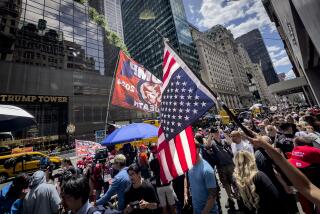Flag, Driving Like an Angeleno Don’t Mix
I think perhaps it’s time we ditched the flags. Not the big fancy ones that hang on the government buildings, hospitals and from streetlights, not even the weird handmade jobs stuck in storefront windows at previously not-considered-particularly-patriotic venues such as the Beverly Center, and certainly not those that people choose to display from their porches. But the car flags, I think, have got to go.
For one thing, many of them are starting to look a little grubby. Which is perfectly understandable--the commute from Culver City to Costa Mesa or Woodland Hills to downtown would take its toll on anyone. And though I understand that the original Star-Spangled Banner managed to play muse while in less than perfect shape, there’s a difference between bombs bursting in air and hard time on the 405. Symbolically speaking, a tattered, war-torn flag is one thing, a dingy and frayed flag quite another.
In the first weeks following the murderous attacks of Sept. 11, few would deny the power and beauty created by the thousands of flags streaking by on our streets and freeways. They were an immediate, visual connection, an attempt to reach out to each other even as we roared past in the glittering anonymity of glass and steel. Like many things American, and most things Angeleno, it quickly got out of hand--some folks were not content with the antennae version or even a single window-anchored model, and soon it was not uncommon to see what from a distance appeared to be a presidential motorcade, or a Fourth of July float as envisioned by Elvis. Or Liberace. Lines of flags, sprays of flags, flags that covered the entire back end of a vehicle. A one-upmanship that essentially misses the entire point.
Many folks also found a certain irony in SUVs that bore the flag--for years now, they have been the unapologetic epitomes of American gluttony, and certainly their disproportionate need for gasoline brings up all sorts of issues connected with the Middle East that one assumes their owners did not intend.
But neither overstatement nor irony lies at the root of the problem. Instead we face the issue we have faced so many times before, the dilemma of the big gesture. Americans love being part of the big gesture--marches, walks, ribbons, bracelets--which is just dandy when it’s a finite event. But with flags, as with AIDS ribbons, things get a little murky when it comes to deployment. When do we stop with the flags? When the war is over? When Osama bin Laden is captured? When they rebuild the World Trade Center? Any of these dates require a commitment that I’m not certain motorists are willing to make, not to mention a whole new canon of long-term car-flag maintenance and disposal. (What are you supposed to do when your flag flies off your car, anyway? Is it like the Eucharist in that it shouldn’t ever touch the floor? So should you stop traffic to retrieve it? Call Caltrans? If you see an abandoned flag in the street, what is your responsibility? And how does one dispose of a gritty, ripped up flag? Do you have to bury it or can you just throw it away?)
All of this would seem insignificant if having a flag on our antennae somehow made the things that it stands for--forbearance, resolve, freedom, tolerance and integrity--manifest in our lives. But when I see a flag-flying Honda cut off one, two, three cars in its pursuit of an untimely death on the 5, or a banner-waving Passat honking bitterly at an elderly woman in a Ford who was not making her left turn fast enough, or a Lexus with two flags and an active cell phone run through a stoplight inches past a baby stroller and two schoolkids, well, let’s just say it’s a mixed message at best.
Two weeks after Sept. 11, a friend sighed and said, “I know things are back to normal in Los Angeles because everyone is driving mean again.”
So it’s either time to lose the flags, or start driving like we remember why they’re there.
*
Mary McNamara can be reached at [email protected].
More to Read
Sign up for Essential California
The most important California stories and recommendations in your inbox every morning.
You may occasionally receive promotional content from the Los Angeles Times.











